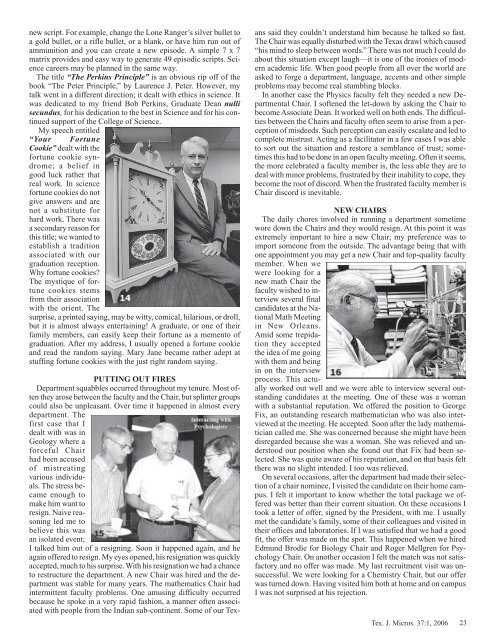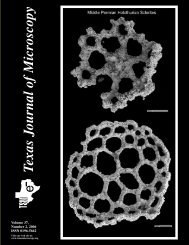Texas Journal of Microscopy Texas Journal of Microscopy
Texas Journal of Microscopy Texas Journal of Microscopy
Texas Journal of Microscopy Texas Journal of Microscopy
You also want an ePaper? Increase the reach of your titles
YUMPU automatically turns print PDFs into web optimized ePapers that Google loves.
new script. For example, change the Lone Ranger’s silver bullet to<br />
a gold bullet, or a rifle bullet, or a blank, or have him run out <strong>of</strong><br />
ammunition and you can create a new episode. A simple 7 x 7<br />
matrix provides and easy way to generate 49 episodic scripts. Science<br />
careers may be planned in the same way.<br />
The title “The Perkins Principle” is an obvious rip <strong>of</strong>f <strong>of</strong> the<br />
book “The Peter Principle,” by Laurence J. Peter. However, my<br />
talk went in a different direction; it dealt with ethics in science. It<br />
was dedicated to my friend Bob Perkins, Graduate Dean nulli<br />
secundus, for his dedication to the best in Science and for his continued<br />
support <strong>of</strong> the College <strong>of</strong> Science.<br />
My speech entitled<br />
“Your Fortune<br />
Cookie” dealt with the<br />
fortune cookie syndrome;<br />
a belief in<br />
good luck rather that<br />
real work. In science<br />
fortune cookies do not<br />
give answers and are<br />
not a substitute for<br />
hard work. There was<br />
a secondary reason for<br />
this title; we wanted to<br />
establish a tradition<br />
associated with our<br />
graduation reception.<br />
Why fortune cookies?<br />
The mystique <strong>of</strong> fortune<br />
cookies stems<br />
from their association<br />
with the orient. The<br />
surprise, a printed saying, may be witty, comical, hilarious, or droll,<br />
but it is almost always entertaining! A graduate, or one <strong>of</strong> their<br />
family members, can easily keep their fortune as a memento <strong>of</strong><br />
graduation. After my address, I usually opened a fortune cookie<br />
and read the random saying. Mary Jane became rather adept at<br />
stuffing fortune cookies with the just right random saying.<br />
PUTTING OUT FIRES<br />
Department squabbles occurred throughout my tenure. Most <strong>of</strong>ten<br />
they arose between the faculty and the Chair, but splinter groups<br />
could also be unpleasant. Over time it happened in almost every<br />
department. The<br />
first case that I<br />
dealt with was in<br />
Geology where a<br />
forceful Chair<br />
had been accused<br />
<strong>of</strong> mistreating<br />
various individuals.<br />
The stress became<br />
enough to<br />
make him want to<br />
resign. Naive reasoning<br />
led me to<br />
believe this was<br />
an isolated event;<br />
I talked him out <strong>of</strong> a resigning. Soon it happened again, and he<br />
again <strong>of</strong>fered to resign. My eyes opened, his resignation was quickly<br />
accepted, much to his surprise. With his resignation we had a chance<br />
to restructure the department. A new Chair was hired and the department<br />
was stable for many years. The mathematics Chair had<br />
intermittent faculty problems. One amusing difficulty occurred<br />
because he spoke in a very rapid fashion, a manner <strong>of</strong>ten associated<br />
with people from the Indian sub-continent. Some <strong>of</strong> our Tex-<br />
ans said they couldn’t understand him because he talked so fast.<br />
The Chair was equally disturbed with the <strong>Texas</strong> drawl which caused<br />
“his mind to sleep between words.” There was not much I could do<br />
about this situation except laugh—it is one <strong>of</strong> the ironies <strong>of</strong> modern<br />
academic life. When good people from all over the world are<br />
asked to forge a department, language, accents and other simple<br />
problems may become real stumbling blocks.<br />
In another case the Physics faculty felt they needed a new Departmental<br />
Chair. I s<strong>of</strong>tened the let-down by asking the Chair to<br />
become Associate Dean. It worked well on both ends. The difficulties<br />
between the Chairs and faculty <strong>of</strong>ten seem to arise from a perception<br />
<strong>of</strong> misdeeds. Such perception can easily escalate and led to<br />
complete mistrust. Acting as a facilitator in a few cases I was able<br />
to sort out the situation and restore a semblance <strong>of</strong> trust; sometimes<br />
this had to be done in an open faculty meeting. Often it seems,<br />
the more celebrated a faculty member is, the less able they are to<br />
deal with minor problems, frustrated by their inability to cope, they<br />
become the root <strong>of</strong> discord. When the frustrated faculty member is<br />
Chair discord is inevitable.<br />
NEW CHAIRS<br />
The daily chores involved in running a department sometime<br />
wore down the Chairs and they would resign. At this point it was<br />
extremely important to hire a new Chair; my preference was to<br />
import someone from the outside. The advantage being that with<br />
one appointment you may get a new Chair and top-quality faculty<br />
member. When we<br />
were looking for a<br />
new math Chair the<br />
faculty wished to interview<br />
several final<br />
candidates at the National<br />
Math Meeting<br />
in New Orleans.<br />
Amid some trepidation<br />
they accepted<br />
the idea <strong>of</strong> me going<br />
with them and being<br />
in on the interview<br />
process. This actually<br />
worked out well and we were able to interview several outstanding<br />
candidates at the meeting. One <strong>of</strong> these was a woman<br />
with a substantial reputation. We <strong>of</strong>fered the position to George<br />
Fix, an outstanding research mathematician who was also interviewed<br />
at the meeting. He accepted. Soon after the lady mathematician<br />
called me. She was concerned because she might have been<br />
disregarded because she was a woman. She was relieved and understood<br />
our position when she found out that Fix had been selected.<br />
She was quite aware <strong>of</strong> his reputation, and on that basis felt<br />
there was no slight intended. I too was relieved.<br />
On several occasions, after the department had made their selection<br />
<strong>of</strong> a chair nominee, I visited the candidate on their home campus.<br />
I felt it important to know whether the total package we <strong>of</strong>fered<br />
was better than their current situation. On these occasions I<br />
took a letter <strong>of</strong> <strong>of</strong>fer, signed by the President, with me. I usually<br />
met the candidate’s family, some <strong>of</strong> their colleagues and visited in<br />
their <strong>of</strong>fices and laboratories. If I was satisfied that we had a good<br />
fit, the <strong>of</strong>fer was made on the spot. This happened when we hired<br />
Edmund Brodie for Biology Chair and Roger Mellgren for Psychology<br />
Chair. On another occasion I felt the match was not satisfactory<br />
and no <strong>of</strong>fer was made. My last recruitment visit was unsuccessful.<br />
We were looking for a Chemistry Chair, but our <strong>of</strong>fer<br />
was turned down. Having visited him both at home and on campus<br />
I was not surprised at his rejection.<br />
Tex. J. Micros. 37:1, 2006<br />
23




